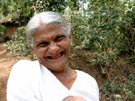Hasya Samrats - Emperors of Humour
Tholan
Tholan is admittedly the first Namboothiri poet of Malayalam. According to the legend he was the originator of what is called "Manipravaalam", an unique poetic style, an admixture of Sanskrit and Malayalam words. Tholan's parodies of manipravalam verses are famous. He was a court poet and jester of Kulasekhara , and parodied the original Sanskrit "Slokams" in Malayalam. He is also reputed to have enacted the role of Sakunthala and lampooned the original play written by his master. Kunhikuttan Thampuran is of the opinion that his name was Neelakandhan. According to Ulloor, ‘Tholan’ is a derivative of the word Athulan meaning peerless. He is believed to have been born in the 9th century AD at a place near Adoor. He lampooned the idiosyncrasies and idiocies of Malayalam poetic style of that age. His greatest contribution is the systematisation and codification of rules regarding the presentation of Koodiyattam and Koothu. He is considered the author of the manuals of acting ("Aattaprakaarams") of several plays in Koodiyaattam. In Koodiyattom, the clown (vidooshaka) is allowed to use Malayalam while the hero recites slokas in Sanskrit. Tholan, is believed to have started this practice.
Kalakkathu Kunchan Nambiar (Rama Paanivaada)
 place of Kunchan Nambiar (1705-1770) is in a small village named Killikkurussimangalam, 8 km from Ottappalam a town in Palakkad district of Kerala. The chief contribution of Nambiar is the invention and popularization of a new performing art known as Thullal. Nambiar is the man who made literary wit and humour understandable to the common man. His innovative satiric art form Ottanthullal reflected his deep sense of social responsibility. The witticism and anecdotes from the life of this genius have become part of the lores and legends of the state.
place of Kunchan Nambiar (1705-1770) is in a small village named Killikkurussimangalam, 8 km from Ottappalam a town in Palakkad district of Kerala. The chief contribution of Nambiar is the invention and popularization of a new performing art known as Thullal. Nambiar is the man who made literary wit and humour understandable to the common man. His innovative satiric art form Ottanthullal reflected his deep sense of social responsibility. The witticism and anecdotes from the life of this genius have become part of the lores and legends of the state.
Kunchan Dinam (May 5) marks the poet's birthday.
To know more about Nambiar visit the following links.
http://en.wikipedia.org/wiki/Kalakkaththu_Kunchan_Nambiar
http://keralaarticles.blogspot.com/2007/01/kunchan-nambiar.html
Venmani Nampoothiries
In the 19th century there arose a new current of poetry, which can be termed as the Venmani movement. Those included in this group were the Venmani Achhan Nampoothiri (1817-1891), his sons Kunjikuttan Thampuran (1865-1913) and Venmani Mahan Nampoothiri (1843-92), the Senior Natuvath Nampoothiri (1840-1912), the junior Natuvath Nampoothiri (1867-1943), Oravankara (1856-1916), Kochunni Thampuran (1857-1925) and Kundoor (1860-1935). The group used to have informal get togethers. This was a group which preferred single stanza poems called Muktaka poems.Among the poems of this group, Poora Prabandham by Venmani Mahan narrates the famous Pooram festival of Thrissur. This group of poets had a carefree life devoid of worries, which is reflected in their compositions. Their works had a wonderful clarity about them. Poetry was a passion for them, that even mutual correspondence was effected in verse. The Venmani current, however reminds us of the Manipravalam times, where the main theme for poetry was the beauty of the female body. Still there remains the holy hymnal and didactic elements which are sometimes evident in their poems.
To know more about Venmani visit the following link.
http://www.namboothiri.com/articles/venmani-school.htm
E.V. Krishna Pillai
E.V. Krishna Pillai (1895-1938) was a renowned writer of Malayalam. Among his works are comedies, dramas, short stories and an autobiography . He was also a columnist and a caricaturist His works like Chiriyum Chintayum and Jeevithasmaranakal are considered as masterpieces. E.V.Krishna Pillai inherited from C.V.Raman Pillai the tradition of social comedy on the one hand and historical tragedy on the other. E.V.'s native comic gift was put to good use in his Pranayakkammishan (1932), B.A.Mayavi (1933) and Vivahakammattam (1934). Himself an actor, he could exploit the devices of stage presentation effectively. The serious side of his personality found expression in his historical tragedies: Sitalakshmi (1926), Raja Kesava Dasan (1930) and Iravikutty Pillai (1934).
E.V.Krishna Pillai inherited from C.V.Raman Pillai the tradition of social comedy on the one hand and historical tragedy on the other. E.V.'s native comic gift was put to good use in his Pranayakkammishan (1932), B.A.Mayavi (1933) and Vivahakammattam (1934). Himself an actor, he could exploit the devices of stage presentation effectively. The serious side of his personality found expression in his historical tragedies: Sitalakshmi (1926), Raja Kesava Dasan (1930) and Iravikutty Pillai (1934).
He is the son-in-law of the legendary Malayalam novelist C.V Raman Pillai and the father of the popular Malayalam film comedian Adoor Bhasi.His skits and essays are relevant even during the present times.
Sanjayan (M.R.Nair)
 His contributions were satirical essays. His articles were criticisms of the contemporary social state. Mr Nair was social critic and writer who pointed out the pathetic condition in our society and life through humorous writing.
His contributions were satirical essays. His articles were criticisms of the contemporary social state. Mr Nair was social critic and writer who pointed out the pathetic condition in our society and life through humorous writing.Vadakkke Koottala Narayanankutti Nair (V.K.N)
 Apart from novels, he wrote short stories, satirical pieces and political commentaries. His works are considered distinctive for their dark humour, trenchant criticism of the political class, and impressive ability to stretch the limits of language.
Apart from novels, he wrote short stories, satirical pieces and political commentaries. His works are considered distinctive for their dark humour, trenchant criticism of the political class, and impressive ability to stretch the limits of language.http://en.wikipedia.org/wiki/V._K._N.
http://www.hindu.com/lr/2004/04/04/stories/2004040400290400.htm
